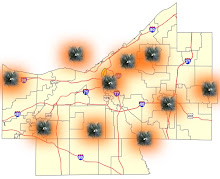
I am happy that our "Call for Discourse" has garnered some attention in the Cleveland blogosphere.
I envisioned a three-railed plan in a previous post and am still ruminating about the structural outline. But from where, what, and whom would a critical dialogue emerge? What would constitute a "Cleveland School" of architecture?
There is no iconic figure, like Kahn or Gehry, or regional predilection that gives rise to someone like Will Bruder, who himself was strongly influence by the Arizona work of Wright and Paul Schweiker. There is no intellectual constellation, like the "Philadelphia-Yale Axis" which helped begin the American post-modern movement.
Only one school exists within Cleveland's orbit, Kent State, which is known more for creating sound and professional undergraduates rather than design research and speculation. The city's architectural community seems to have only a tenuous connection to the intellectual behemoths at Ohio State, such as Jeff Kipnis, Bob Somol, and others.
I am not looking to specify a character of a movement. That would be the wrong way to spark "discourse". The "schools" usually evolve from the extenuating circumstances of a time and place. What are our extenuating circumstances? What is of our time and and place? What local idiosyncrasies could inform an intelligent discourse that Cleveland architects could share with the greater realm of Architecture?





2 comments:
Being I can't seem to be able to email you directly, just wanted you to know that to further the "rail" I have added a link to this blog, as well as "The Common" at Urban Repair.
You might also be interested in checking out Urban Spaces | Urban Places.
For a discourse, Cleveland needs to take a survey of what is around itself. This is a city with a once unparalleled urban landscape that has faced resurgence after resurgence. The history of the city's planning, industries, etc. all lend themselves to further discussion and introspection before a trajectory of our current state can be projected. Likewise, the significance of starting a dialogue is that we as a profession start to take on greater responsibility for what is built, planned and developed within this city than it has been reserved for the few. The basic fact is that there needs to be a discussion about evolving our current situation here (how, why, when, what, etc.) rather than saying, "Oh, well," and simply going back to a capacity of production.
Cleveland has the intellectual capacity to compete with the architectural behemoths of LA, NYC, London, and beyond. We just have to tap into it.
Post a Comment